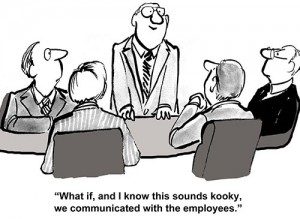© 2025 Auto/Mate, Inc. All Rights Reserved.
by Mike Esposito, President and CEO, Auto/Mate Dealership Systems
High employee turnover rates continue to be a problem for car dealers, according to the 2015 NADA Workforce Study. Competition for talent is fierce. For dealers, this means that retaining your best employees is perhaps even more important than the ability to find and hire new talent.
 At Auto/Mate we hire people with car dealership experience, so we have interviewed literally hundreds, if not thousands of ex car-dealership employees. In our experience, here are the top five reasons why good employees quit their previous position(s):
At Auto/Mate we hire people with car dealership experience, so we have interviewed literally hundreds, if not thousands of ex car-dealership employees. In our experience, here are the top five reasons why good employees quit their previous position(s):
1) Management Doesn’t Care. Whether this is true or just a perception, when employees feel like their managers don’t care about them they become unhappy. To be a good manager, it’s important to form personal connections with your employees, recognize their achievements and honor your commitments to them.
One comment we hear a lot is “They promised I would make more money than I did.” This complaint is also about the fact that a manager at that dealership didn’t honor a commitment to this individual. It’s important in the hiring process to not oversell your opportunities. If the last salesperson in that position made $60K a year don’t promise new job applicants they’ll make $80K. Once the new hire comes on board and learns that realistically they will make $60K, they will feel duped and rightfully so.
The best managers are caring, approachable, trustworthy and honorable. If your best employees are leaving, take a closer look at their managers. Do they possess these important qualities?
2) No Opportunity for Advancement/Training. Another reason employees quit is because there were no opportunities to advance their careers or learn new skills. When you have a talented employee, it’s up to your managers to find ways in which they can expand their skill set, take on new responsibilities and advance their careers. The most talented employees want feedback and recognition. If your managers don’t provide that, your best people will feel unappreciated and become complacent.
3) Overworked. Another comment we hear a lot is “I got burned out.” It’s all too common for managers to solve their productivity problems by expecting their best employees to step up to the plate. But what do those employees get in return? When people are continuously expected to work long hours with no additional compensation, they feel taken advantage of. According to research from Stanford, productivity per hour declines sharply when the workweek exceeds 50 hours, and after 55 hours productivity drops so much that they may as well not be working at all. So if you must overwork your best employees, be sure to compensate them in some way and make sure they know their contribution is appreciated.
4) Not Passionate About What They Do. Talented people have passion, and providing opportunities for them to pursue their passions improves productivity and job satisfaction. Many managers want people to work within certain parameters, perhaps out of fear that productivity will decline if they let people pursue other areas of interest. In my experience the opposite is true. If you let people discover new interests, find their passions and pursue new goals, then their overall productivity increases. If this requires that an employee move from one department to another, even if they have no prior experience in that area, managers should be open to the idea. It’s better to lose a talented individual to another department than to a competitor.
5) Don’t Feel Like They’re a Part of Something. In Daniel Pink’s book Drive, one of the biggest motivators for employees is to feel like what they do matters. Employees want to feel like they’re contributing towards something that’s bigger than themselves. It’s up to management and principals to define what that “something bigger” is.
What’s your vision for your dealership? Why are you in business (other than to make money?) What are your core values? How are you giving back and helping your employees and your community? Do your employees feel like they’re part of a team or a family, or do they feel like just a number?
This vision of who the company is and where it’s going should be communicated with employees on a regular basis. The vision has to be about more than being successful and making money. A motivating vision might include being the best at something, first at something or community causes.
The best leaders and managers challenge employees to accomplish things that seem inconceivable at first. Instead of setting mundane, incremental goals, they set lofty goals that push people out of their comfort zones. Then, those managers do everything in their power to help the employees succeed. Make it clear you need your employees help to get you where you’re going.
People rarely quit jobs; they leave managers they don’t like or trust, and they leave companies that don’t offer career advancement or job training opportunities. It’s difficult to find hard-working, intelligent employees, so when you have one on staff, be sure to let them know they are valued for the rare commodity that they are.
What are your tips for retaining top talent?